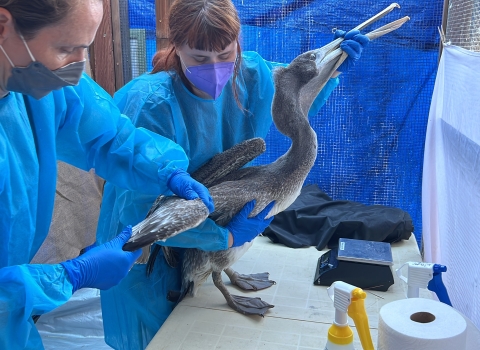DENVER – The U.S. Fish and Wildlife Service (FWS) is announcing continued funding through 2021 to the U.S. Department of Agriculture’s (USDA) Animal and Plant Health Inspection Service (APHIS) and Wildlife Services (WS) for collaborative efforts addressing grizzly bear-livestock conflicts in Montana.
“The Trump Administration has prioritized implementing practices to address issues impacting private landowners and the livestock industry,” said FWS Director Aurelia Skipwith. “U.S. Fish and Wildlife Service is proud to work alongside the USDA to address grizzly bear livestock depredations in Montana. Partnerships like this allow us to further grizzly bear conservation.”
“Together, we are protecting livestock and conserving our valuable wildlife resources in Montana. USDA appreciates FWS’ support for continued partnership with livestock producers and the Montana Department of Fish, Wildlife and Parks,” said Janet Bucknall, Deputy Administrator, USDA, APHIS, WS.
FWS is responsible for managing grizzly bears under the Endangered Species Act. Grizzly bears in the lower 48 states were originally listed in 1975 as a threatened species. There is one umbrella recovery plan for all grizzly bears in the lower 48 that was developed in 1982 and revised in 1993, and some ecosystems have supplements that add or update habitat-based and/or demographic recovery criteria for that particular population of bears. In January, FWS initiated a 5-year status review of the grizzly bear in the lower 48. A 5-year status review is based on the best scientific and commercial data available at the time of the review.
FWS works in close collaboration with WS to resolve conflicts among bears, people and livestock in Montana. In October, Director Skipwith traveled to Great Falls, MT., to participate in a roundtable hosted by Sen. Steve Daines (R-MT) to discuss grizzly bear issues with landowners and other stakeholders.
“We would like to thank the U.S. Fish and Wildlife Service and Senator Daines for continuing this critical funding to reduce grizzly bear conflicts,” said Montana Stockgrowers Association President Jim Steinbeisser. “Today as grizzlies expand their habitat, they pose challenges to those who make a living from the land. This funding will continue efforts of many livestock producers across the state who have implemented a host of tools and techniques to protect their property and maintain working ranches. Using proven tools and working together as neighbors can be a practical way to protect human safety, maintain profitable operations, and uphold the strong ethic of stewardship Montana producers are known for.”
“As a Montana rancher and Legislator, I have seen firsthand the growing issues associated with grizzly habitat expansion,” said Speaker-Elect of the Montana House of Representatives Wylie Galt. “Growing grizzly populations across the state are leading to increased conflicts with livestock as well as outdoor recreationists. I want to thank the U.S. Fish and Wildlife Service, Senator Daines, and Montana stakeholders for coming together to find solutions which will protect Montana’s ranching and outdoor recreation industries as well as grizzly conservation efforts.
“The increasing population of Grizzly bears along the Rocky Mountain Front is a success story in which we can all take pride, but it has come with a price to citizens of Montana along the front,” stated Cascade County Commissioner Joe Briggs. “The ongoing recovery of this species brings with it a predictable increase in clashes between the bears and humans as the bears expand their territory. This funding from the U.S. Fish and Wildlife Service is an important element to help mitigate and manage these conflicts. We thank the Trump administration, Senator Daines and Director Skipwith for their ongoing efforts to partner with the people of Montana to address these conflicts for the benefit of both humans and Grizzly.”
The continued funding by FWS of $250,000 through 2021 allows WS to provide enhanced operational assistance for agricultural producers and others experiencing conflicts with grizzly bears in Montana. This continued partnership helps address chronic areas of grizzly predation by applying an integrated damage management approach incorporating non-lethal tools and, when necessary, lethal removal to prevent grizzly bears from attacking livestock.
APHS WS indicates 157 complaints of possible grizzly bear depredation were received in FY 2019, and of those, 141 were confirmed domestic animals killed or injured. Thirty-six domestic animal deaths or injuries were determined to be probable. In FY20, there were 148 complaints of possible grizzly bear depredation, and of those, 124 domestic animals were confirmed killed or injured due to grizzly bears. Twenty-five domestic animal deaths or injuries determined to be probable. In addition, anecdotal information suggests that the denning season in some areas might be slightly shorter - mostly for males.
A strong partnership between FWS, WS and Montana’s Department of Fish, Wildlife and Parks is critical in managing grizzly bear conflicts with local livestock producers and the people of Montana. Anyone experiencing problems with grizzly bears in Montana or have general questions about management in the state can reach each of the agencies by calling the following numbers:
U.S. Fish and Wildlife Service – (406) 243-4903
USDA Wildlife Services – (406) 657-6464 (statewide)
(406) 439-5943 (western Montana)
(406) 200-2180 (eastern Montana)
Montana’s Department of Fish, Wildlife and Parks – (406) 444-2612
The mission of the U.S. Fish and Wildlife Service is working with others to conserve, protect, and enhance fish, wildlife, plants, and their habitats for the continuing benefit of the American people. For more information on our work and the people who make it happen in the West, visit our website, or connect with us through any of these social media channels: Facebook, Twitter, Flickr, YouTube, and Instagram.


